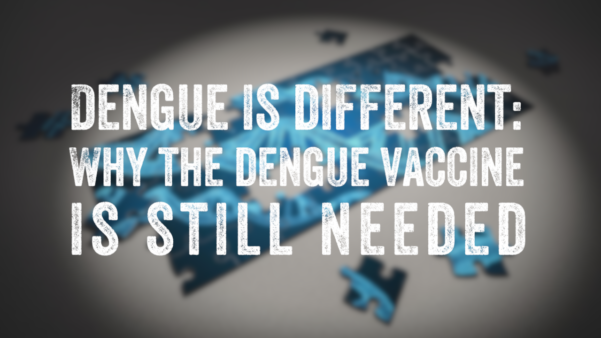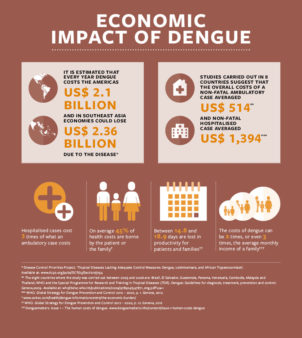- by Gary Finnegan
Dengue is different: why the dengue vaccine is still needed

The unique characteristics of dengue fever mean the dengue vaccine is different to other vaccines, according to an expert from The Philippines
Most vaccines are given to infants before they are exposed to a disease-causing virus or bacteria. Dengue is different. Because the disease can be caused by four types of virus, people who have already been exposed to a first infection are good candidates for the vaccine.
‘The breakthrough dengue vaccine does not work like a traditional vaccine,’ says Dr. Edsel Maurice Salvana. ‘Instead, it is meant to reduce the risk of severe dengue infection. And it does this very well.’
In the wake of a political and media storm in the Philippines, Dr. Salvana has been calmly injecting a dose of science into the public discussion. As Director of the Institute of Molecular Biology at the National Institutes of Health and a practicing physician who sees dengue fever on a daily basis, he has urged the public to take a balanced view of why the dengue vaccine is still needed – provided it is used appropriately.
The trouble began in late November when Sanofi Pasteur publicly shared data showing that people with prior dengue infections were best-suited to the dengue vaccine. There are four types of dengue and a second infection is often worse than the first. Because the body responds to vaccination in the same way as it would to an initial infection, it may not be advisable to vaccinate those who have never been infected by dengue.
Read why a second dengue infection is often worse than the first
The dengue immunization program introduced by the previous government in Manila has now been suspended by their successors. This has led to considerable public consternation, damaging the perception of the dengue vaccine – and potentially harming how the public views others vaccines too.
As a TED fellow and frequent media contributor, Dr. Salvana is more media savvy than most epidemiologists. He has been popping up on CNN, publishing opinion pieces on Esquire magazine and using Facebook to directly appeal to the public, lawmakers, regulators, and industry to make the most of a life-saving vaccine.
Amid the online chatter about whether the dengue vaccine is still needed, is there a risk that people are losing sight of the impact of dengue fever? ‘Certainly,’ Dr. Salvana told Break Dengue. ‘Many people cannot believe that the seroprevalence of dengue infection in our country is so high – it’s more than 90% at 11 years old.’
This means that most people have been exposed to dengue and are thus good candidates for the vaccine – provided they can show this, either through dengue diagnostics testing or medical records.
‘The panic has severely impacted the vaccine in our country, and this is despite the fact that the other 18 countries that approved the vaccine continue to use it, and Singapore even approved after the label change,’ he says. ‘It has also lowered uptake of other vaccines, and this is truly tragic.’
Dr. Salvana says people who have already had some doses of the vaccine but not completed the three-dose course should complete the series. He is calling on authorities to lift the temporary suspension which prevents the vaccine from being used.

Image courtesy of Malaria Consortium.
In the meantime, he is also offered some context for the public on how the dengue vaccine could be used in future. ‘[With the vaccine] there is a 90% decreased risk of hospitalized with severe dengue and an 80% decreased risk of hospitalization in those with previous dengue infection,’ he says.
He argues that the public and decision-makers will need to weigh the certain benefits of dengue vaccination against any risk that it may pose for the small number of people in dengue-endemic areas who have never hard dengue.
Dr. Salvana’s view chimes with others outside the Philippines who argue that Manila must not throw the baby out with the bathwater. Dr. Heidi Larson, Director of the Vaccine Confidence Project at the London School of Hygiene and Tropical Medicine, has drawn a contract between the air of panic in the Philippines and the more sanguine reaction in Brazil.
‘The Philippines made headlines with public outrage and a suspension of the vaccine program, as well as threats to sue the manufacturer,’ Larson wrote on her influential blog. ‘Brazil has stood by scientific evidence and, recognizing that the vaccine still has benefits although it carries some risk, it is facing this risk with resolve.’
Meanwhile, the WHO has updated a Questions and Answers document on the vaccine. Pending a review of data, it recommends vaccination only in individuals with a documented past dengue infection, either by a diagnostic test or by a documented medical history of past dengue illness. The Organisation will update its official position paper in April. ‘Meanwhile, WHO encourages the development of a rapid diagnostic assay to determine past dengue infection.’
—

